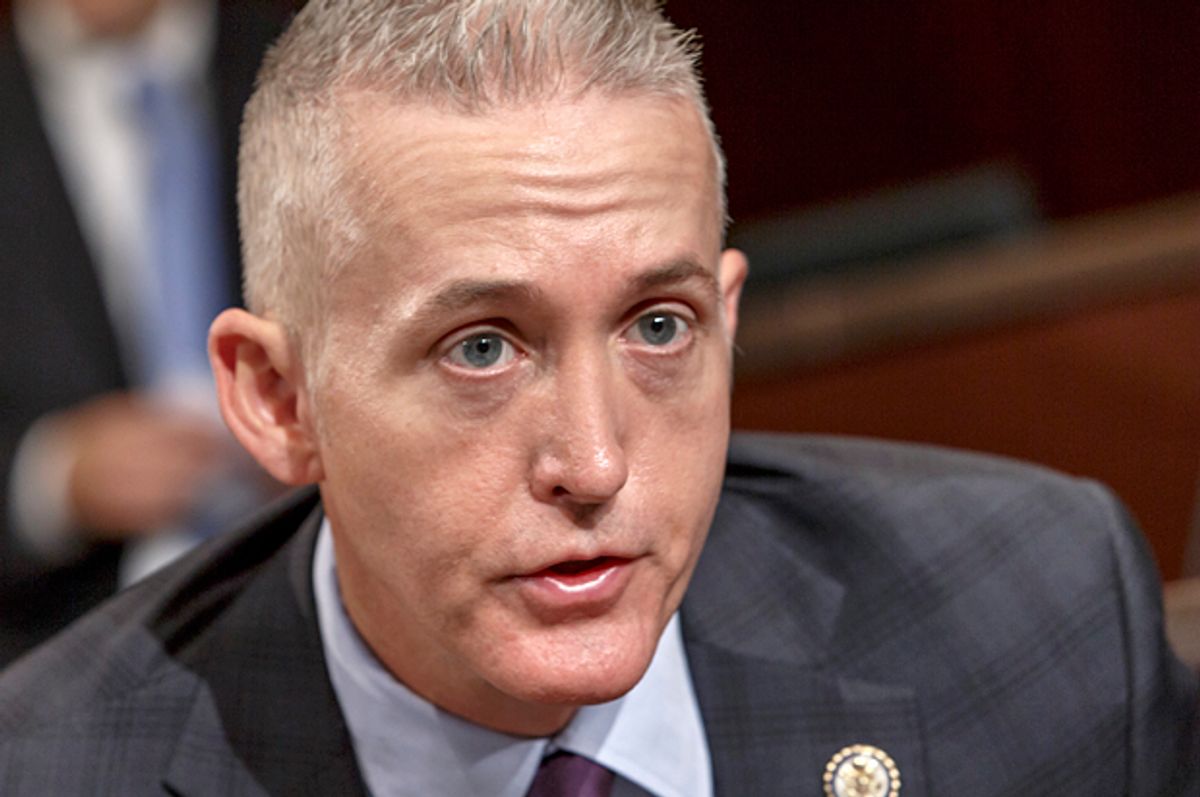Last week, Bloomberg Politics officially reported what pretty much everyone assumed was going to happen: the House Select Committee on Benghazi will likely push back the release of its findings until sometime in 2016, right in the thick of the presidential race. With former Secretary of State Hillary Clinton overwhelmingly favored to be the Democratic nominee, the committee has ensured that Benghazi will linger on as an issue.
That the Benghazi committee would stretch things out into 2016 was never really in question. In the months after the committee was formed, stories were already being written about how committee chair Trey Gowdy was settling in for a long and drawn-out investigation that would, in Gowdy’s words, be “willing to risk answering the same question twice rather than risk not answering it once.” And throughout the entire process, Gowdy has been talking about how the process could stretch on into the indefinite future. The day after he was selected to lead the committee, Gowdy was asked on Morning Joe if the investigation would last into 2016 and he said it was a definite possibility if the Obama administration “is slow-walking document production.” Last September he said that he hoped things would be wrapped up by the end of 2015, but “we cannot predict what witnesses will say, what documents may be produced, and whether either will lead to additional lines of appropriate inquiry.”
And the Republicans in Congress have told Gowdy they’ll give him all the time in the world and all the money he needs to do whatever investigating he feels is necessary. With an open-ended mandate and a hot-button issue to investigate and a chance to play a role in the upcoming presidential race, he has every incentive to drag things out.
What’s less clear is what he hopes to find that the many other inquiries by congressional committees and other investigative bodies have not turned up. Gowdy has already expanded the Benghazi committee’s mandate to include an examination of Hillary Clinton’s email practices while she was secretary of state – an issue he himself has called “broader than Libya and broader than Benghazi.” Clinton wanted to testify about the emails in public and as soon as possible, but Gowdy said no, and instead wanted her to testify in private and then testify again in public at a later date. Through it all, Gowdy has insisted that he’s just chasing facts. “As I have said countless times before,” a Gowdy statement from last week read, “the committee investigation will go wherever the facts may lead. I have made no presumption of right or wrongdoing on anyone’s part with respects to the Benghazi terrorist attacks.”
It’s kind of hard to take those statements seriously. The reason Gowdy’s Benghazi committee exists is because Republicans are convinced that the Obama administration – and Hillary Clinton in particular – have committed some as-yet undiscovered act of deliberate wrongdoing. Gowdy has already made several references to Benghazi inquiries as a “trial” in which the Obama administration is the “defense” and the American people are the “jury,” which certainly indicates a presumption of wrongdoing. And before he took up the solemn duty of chairing the Benghazi investigation, Gowdy wasn’t shy about throwing around accusations of sprawling Benghazi “cover-ups.”
In May 2013, Gowdy went on Hugh Hewitt’s radio show to hype up a House Oversight Committee hearing that Republicans were promising would have blockbuster revelations and shocking whistleblower testimony that would leave everyone good and angry. Gowdy told Hewitt that the committee would prove the Obama administration lied about Benghazi, and that information would come out that would be damaging to Clinton’s then-assumed presidential aspirations:
GOWDY: And I can tell you beyond any reasonable doubt that he was devastated by what Susan Rice said. And you know, if Hillary Clinton’s defense needs to be, ‘I was so out of it and not doing my job that I never talked to a Greg Hicks or anyone else, or Susan Rice, didn’t prepare her before she went on the five Sunday talk shows’, then that’ll just have to be her defense. Don’t blame me because I was absent at the switch. I don’t think that’s going to bode well for her future ambitions. But I know he can say, and will, that Susan Rice’s Sunday morning talk show directly contradicted the evidence the president of Libya, Christopher Stevens’ dying declaration, and negatively impacted our ability to find out what happened. Now if that’s not enough to infuriate our fellow citizens, I don’t know how much better we can do.
That hearing turned out to be something of a dud, at least when stacked against the hype that surrounded it. But Gowdy was at least being honest about the devastating consequences he envisioned for the people who he presumed were guilty of wrongdoing – including candidate-in-waiting Hillary Clinton. Now he says he’s just interested in the facts, and his interest will just happen to carry over well into 2016.



Shares